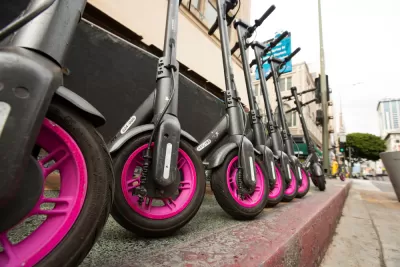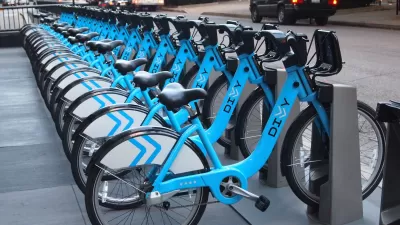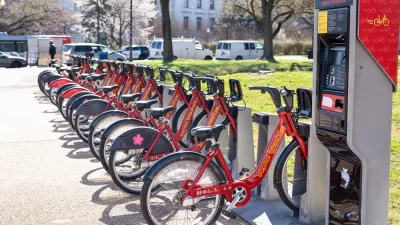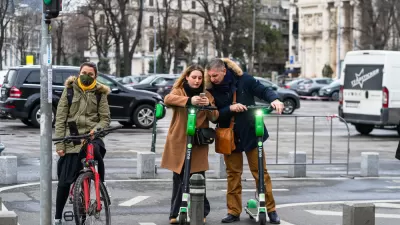After failing to deliver on promises of frictionless, free shared mobility, the operator will begin docking its scooters at stations to reduce sidewalk obstructions and eliminate the need to collect scooters for recharging.

After years of tension with cities, Lyft is planning to dock its fleet of electric scooters, which are frequently blamed for creating sidewalk clutter and obstructing walkways thanks to their ability to be parked anywhere. Sri Taylor and Sarah Holder report on the company’s plan for Bloomberg CityLab.
As Taylor and Holder explain, “The company oversees several municipal bikeshare programs, including New York City’s Citi Bike; according to Techcrunch, it has 100,000 bike docks that could be converted to the scooter-friendly option.” After the company launched a pilot docking program in Chicago last May, Lyft says the city’s shared mobility program, Divvy, saw increased ridership for both bikes and scooters. “It could also make rebalancing fleets easier for operators, help users predictably locate available wheels and facilitate coordination with public transit services.”
Free-floating scooters also must be recharged by taking them back to operations centers. “The company estimates that bringing in-dock power to 20% of a city’s station network can reduce drive-by battery swaps by 90%, and reduce the vehicle miles traveled to do it by 75%.”
Lyft plans to roll out a system of 1,000 next-gen docked scooters in Washington, D.C. this month.
FULL STORY: Lyft Has a Plan to Dock Its E-Scooter Fleet

Alabama: Trump Terminates Settlements for Black Communities Harmed By Raw Sewage
Trump deemed the landmark civil rights agreement “illegal DEI and environmental justice policy.”

Planetizen Federal Action Tracker
A weekly monitor of how Trump’s orders and actions are impacting planners and planning in America.

The 120 Year Old Tiny Home Villages That Sheltered San Francisco’s Earthquake Refugees
More than a century ago, San Francisco mobilized to house thousands of residents displaced by the 1906 earthquake. Could their strategy offer a model for the present?

In Both Crashes and Crime, Public Transportation is Far Safer than Driving
Contrary to popular assumptions, public transportation has far lower crash and crime rates than automobile travel. For safer communities, improve and encourage transit travel.

Report: Zoning Reforms Should Complement Nashville’s Ambitious Transit Plan
Without reform, restrictive zoning codes will limit the impact of the city’s planned transit expansion and could exclude some of the residents who depend on transit the most.

Judge Orders Release of Frozen IRA, IIJA Funding
The decision is a victory for environmental groups who charged that freezing funds for critical infrastructure and disaster response programs caused “real and irreparable harm” to communities.
Urban Design for Planners 1: Software Tools
This six-course series explores essential urban design concepts using open source software and equips planners with the tools they need to participate fully in the urban design process.
Planning for Universal Design
Learn the tools for implementing Universal Design in planning regulations.
Clanton & Associates, Inc.
Jessamine County Fiscal Court
Institute for Housing and Urban Development Studies (IHS)
City of Grandview
Harvard GSD Executive Education
Toledo-Lucas County Plan Commissions
Salt Lake City
NYU Wagner Graduate School of Public Service





























